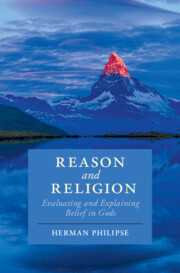Refine search
Actions for selected content:
4 results
24 - The Constitution’s Beating Heart
- from Part V - The Imagined Order of the Constitution
-
- Book:
- The Story of Constitutions
- Published online:
- 19 October 2023
- Print publication:
- 02 November 2023, pp 283-295
-
- Chapter
- Export citation

Reason and Religion
- Evaluating and Explaining Belief in Gods
-
- Published online:
- 21 April 2022
- Print publication:
- 28 April 2022
Chapter 11 - The causal contribution of mental events
-
-
- Book:
- New Perspectives on Type Identity
- Published online:
- 05 April 2012
- Print publication:
- 08 March 2012, pp 230-250
-
- Chapter
- Export citation
Chapter 34 - Intelligence as a Predictor of Health, Illness, and Death
- from Part VII - Intelligence and Society
-
-
- Book:
- The Cambridge Handbook of Intelligence
- Published online:
- 05 June 2012
- Print publication:
- 30 May 2011, pp 683-708
-
- Chapter
- Export citation
